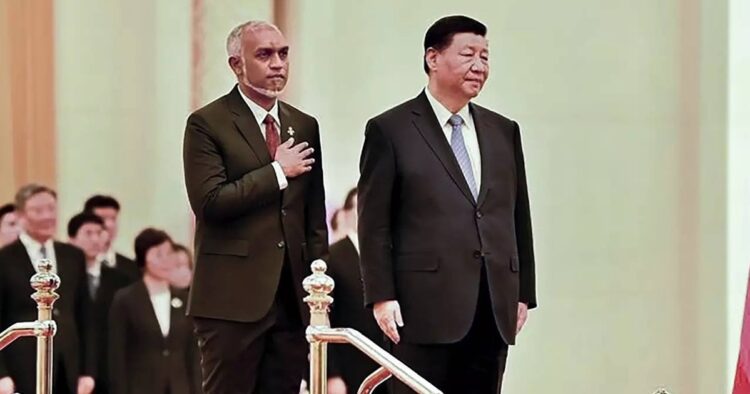The Maldives, a small island nation in the Indian Ocean, is facing a significant risk of “debt distress,” according to a warning from the International Monetary Fund (IMF) issued on Wednesday. The country has borrowed heavily from China and has shifted its allegiance away from Bharat, raising concerns about its financial stability.
Since President Mohamed Muizzu, who is pro-China, came into power in November, Beijing has pledged additional funding for the Maldives. Muizzu recently expressed gratitude to China for its support, particularly for development funds, after a visit to Beijing last month.
The IMF did not disclose specific details about the Maldives’ foreign debt but emphasized the urgent need for policy adjustments to address the country’s fiscal deficits and high levels of public debt. Without significant changes in policy, the Maldives is projected to remain at high risk of both external and overall debt distress, according to the IMF’s review of the country’s economy.
Despite being known for its picturesque white sand beaches and heavily relying on tourism, which accounts for nearly one-third of its economy, the Maldives has faced economic challenges exacerbated by the COVID-19 pandemic. While plans for airport expansion and hotel development aim to stimulate growth, uncertainties persist, and risks remain tilted towards the downside, as highlighted by the IMF.
Former President Abdulla Yameen, who ruled the Maldives for five years until 2018, heavily borrowed from Beijing for various construction projects. As a result, a significant portion of the country’s foreign debt—42% as of 2021, totaling over $3 billion—is owed to China, according to the World Bank citing the Maldives’ finance ministry.
President Muizzu, under whose leadership there has been a request for Bharatiya troops operating reconnaissance aircraft in the Maldives to leave by May 10, has vowed to strengthen the country’s military capabilities to defend its vast maritime territory. The Maldives, with its chain of 1,192 tiny coral islands stretching approximately 800 kilometers across the equator, sits at a crucial juncture for global east-west shipping lanes.
In summary, the Maldives’ reliance on heavy borrowing from China, coupled with uncertainties surrounding its economic recovery and geopolitical shifts in alliances, has raised concerns about its financial stability and debt sustainability. The IMF’s warning underscores the urgent need for policy adjustments to mitigate the risk of debt distress and safeguard the Maldives’ economic future.

















Comments